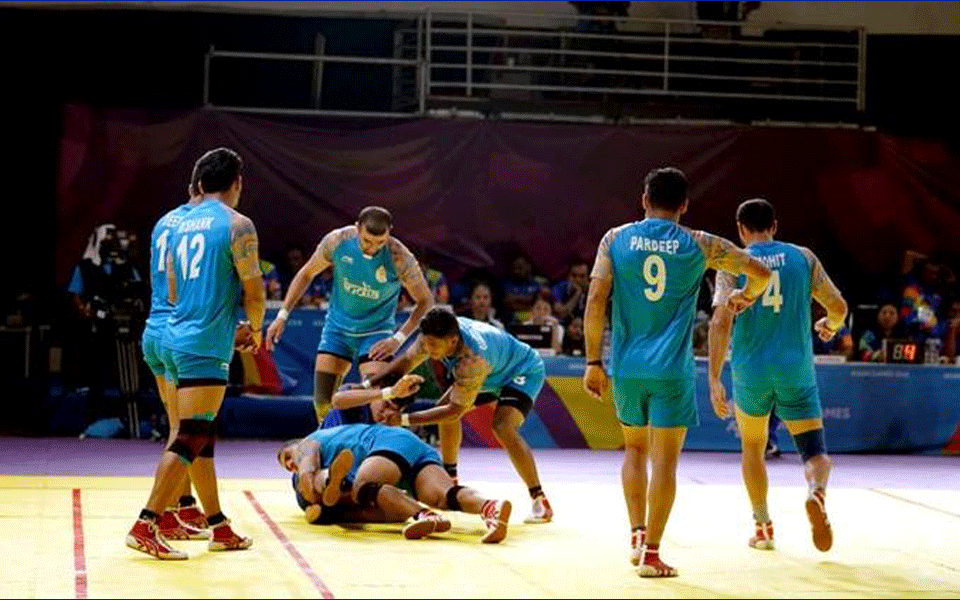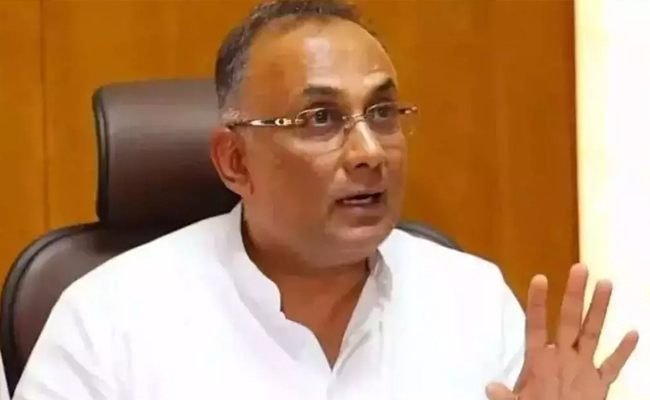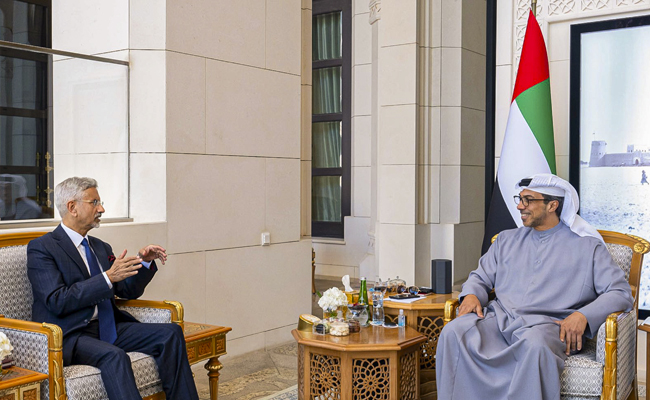Jakarta, Aug 23 : Iran scripted history in the annals of world kabaddi by stunning India 27-18 in the semi-finals of the 18th Asian Games here on Thursday.
This is the first time since the traditional rural sport was included in the Asian Games in 1990 that the Indian men's team will not take home the gold.
Apart from ending India's 28-year run as defending champions at the Asiad, Thursday's defeat was also India's first at any major tournament. Along with the Asian Games, India have won every World Cup, Asia Cup and South Asian Games till now.
This is also Iran's first victory over India in the knock-out stages of any tournament.
In a match which saw a thrilling battle between Indian raiders and Iran's defence, Iran proved superior. Iran struggled initially, but used their expertise in the super tackle to script an amazing comeback.
Right from the start, Indian raiders struggled to get points while Iran, on the other hand, maintained their dominance throughout the match thanks to their defence. Iran took most of their points through super-tackles which helped them overpower overwhelming favourites India.
The match was off to a somewhat tentative start before exploding with power-packed action in the second half. Both teams displayed a strong, physical style and sometimes overt aggression which kept the packed stadium at the edge of their seats.
Rishank Devadiga drew first blood for India through a brilliant raid followed by three more consecutive points, thanks to defender Girish Ernak.
When the scoreboard was reading 4-0, Iran defender Nabibaksh grabbed Rishank to open his team's account.
Experienced raider Pardeep Narwal also joined the party and stole few points to make score read 6-1. But after that Abolfazl Maghsoudlou got the big fish as he touched defender Girish to send him out.
When the score was 6-4 in favour of India, the series of super-tackles started for Iran which blew away India's attack. India started giving away easy points and both teams went to the half time break locked at 9-9.
The second half saw Iran dominating Indian raiders. The late substitution of star player Rahul Chaudhary also allowed Iran to put pressure on India.
Rahul came on the mat with less than 10 minutes remaining and straightaway took three points but lack of support from defence and other raiders put Rahul on back-foot.
Monu Goyat, Pardeep, Rishank also looked hapless in front of the Iran defence and went off the mat one by one.
Iran Nabibaksh then touched Mohit and Girish towards the end to inflict an all out on their opponents and dash Indian hopes. At the end, Abozar Mighani and Fazel Athrachali made it a formality and comfortably marched into the final.
Let the Truth be known. If you read VB and like VB, please be a VB Supporter and Help us deliver the Truth to one and all.
New Delhi: A bill to set up a 13-member body to regulate institutions of higher education was introduced in the Lok Sabha on Monday.
Union Education Minister Dharmendra Pradhan introduced the Viksit Bharat Shiksha Adhishthan Bill, which seeks to establish an overarching higher education commission along with three councils for regulation, accreditation, and ensuring academic standards for universities and higher education institutions in India.
Meanwhile, the move drew strong opposition, with members warning that it could weaken institutional autonomy and result in excessive centralisation of higher education in India.
The Viksit Bharat Shiksha Adhishthan Bill, 2025, earlier known as the Higher Education Council of India (HECI) Bill, has been introduced in line with the National Education Policy (NEP) 2020.
The proposed legislation seeks to merge three existing regulatory bodies, the University Grants Commission (UGC), the All India Council for Technical Education (AICTE), and the National Council for Teacher Education (NCTE), into a single unified body called the Viksit Bharat Shiksha Adhishthan.
At present, the UGC regulates non-technical higher education institutions, the AICTE oversees technical education, and the NCTE governs teacher education in India.
Under the proposed framework, the new commission will function through three separate councils responsible for regulation, accreditation, and the maintenance of academic standards across universities and higher education institutions in the country.
According to the Bill, the present challenges faced by higher educational institutions due to the multiplicity of regulators having non-harmonised regulatory approval protocols will be done away with.
The higher education commission, which will be headed by a chairperson appointed by the President of India, will cover all central universities and colleges under it, institutes of national importance functioning under the administrative purview of the Ministry of Education, including IITs, NITs, IISc, IISERs, IIMs, and IIITs.
At present, IITs and IIMs are not regulated by the University Grants Commission (UGC).
Government to refer bill to JPC; Oppn slams it
The government has expressed its willingness to refer it to a joint committee after several members of the Lok Sabha expressed strong opposition to the Bill, stating that they were not given time to study its provisions.
Responding to the opposition, Parliamentary Affairs Minister Kiren Rijiju said the government intends to refer the Bill to a Joint Parliamentary Committee (JPC) for detailed examination.
Congress Lok Sabha MP Manish Tewari warned that the Bill could result in “excessive centralisation” of higher education. He argued that the proposed law violates the constitutional division of legislative powers between the Union and the states.
According to him, the Bill goes beyond setting academic standards and intrudes into areas such as administration, affiliation, and the establishment and closure of university campuses. These matters, he said, fall under Entry 25 of the Concurrent List and Entry 32 of the State List, which cover the incorporation and regulation of state universities.
Tewari further stated that the Bill suffers from “excessive delegation of legislative power” to the proposed commission. He pointed out that crucial aspects such as accreditation frameworks, degree-granting powers, penalties, institutional autonomy, and even the supersession of institutions are left to be decided through rules, regulations, and executive directions. He argued that this amounts to a violation of established constitutional principles governing delegated legislation.
Under the Bill, the regulatory council will have the power to impose heavy penalties on higher education institutions for violating provisions of the Act or related rules. Penalties range from ₹10 lakh to ₹75 lakh for repeated violations, while establishing an institution without approval from the commission or the state government could attract a fine of up to ₹2 crore.
Concerns were also raised by members from southern states over the Hindi nomenclature of the Bill. N.K. Premachandran, an MP from the Revolutionary Socialist Party representing Kollam in Kerala, said even the name of the Bill was difficult to pronounce.
He pointed out that under Article 348 of the Constitution, the text of any Bill introduced in Parliament must be in English unless Parliament decides otherwise.
DMK MP T.M. Selvaganapathy also criticised the government for naming laws and schemes only in Hindi. He said the Constitution clearly mandates that the nomenclature of a Bill should be in English so that citizens across the country can understand its intent.
Congress MP S. Jothimani from Tamil Nadu’s Karur constituency described the Bill as another attempt to impose Hindi and termed it “an attack on federalism.”



_vb_22.jpeg)

